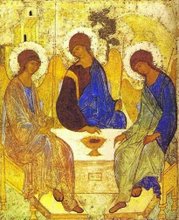108. The fundamental message of Sacred Scripture proclaims that the human person is a creature of God (cf. Ps 139:14-18), and sees in his being in the image of God the element that characterizes and distinguishes him: “God created man in his own image, in the image of God he created him; male and female he created them” (Gen 1:27). God places the human creature at the centre and summit of the created order. Man (in Hebrew, “adam”) is formed from the earth (“adamah”) and God blows into his nostrils the breath of life (cf. Gen 2:7). Therefore, “being in the image of God the human individual possesses the dignity of a person, who is not just something, but someone. He is capable of self-knowledge, of self-possession and of freely giving himself and entering into communion with other persons. Further, he is called by grace to a covenant with his Creator, to offer him a response of faith and love that no other creature can give in his stead”[204].
-Compendium of the Social Doctrine of the Church
skip to main |
skip to sidebar

"Rublev's icon gives us a glimpse of the house of perfect love" (Nouwen)

John 13:34. A new commandment I give unto you: That you love one another, as I have loved you, that you also love one another.

Blog offered in the hands of our Lady
Reflections on the mystery of covenants, the means by which God relates to us.
The Building of a Civilization of Love
The third area of commitment that comes with love is that of daily life with its multiple relationships. I am particularly referring to family, studies, work and free time. Dear young friends, cultivate your talents, not only to obtain a social position, but also to help others to “grow”. Develop your capacities, not only in order to become more “competitive” and “productive”, but to be “witnesses of charity”. In addition to your professional training, also make an effort to acquire religious knowledge that will help you to carry out your mission in a responsible way. In particular, I invite you to carefully study the social doctrine of the Church so that its principles may inspire and guide your action in the world. May the Holy Spirit make you creative in charity, persevering in your commitments, and brave in your initiatives, so that you will be able to offer your contribution to the building up of the “civilisation of love”. The horizon of love is truly boundless: it is the whole world!
- Pope Benedict XVI, WYD 2007 MESSAGE, Growing in love each day
3:12. Not as though I had already attained, or were already perfect: but I follow after, if I may by any means apprehend, wherein I am also apprehended by Christ Jesus.
3:13. Brethren, I do not count myself to have apprehended. But one thing I do: Forgetting the things that are behind and stretching forth myself to those that are before,
3:14. I press towards the mark, to the prize of the supernal vocation of God in Christ Jesus.
-St. Paul to Philippians
- Pope Benedict XVI, WYD 2007 MESSAGE, Growing in love each day
3:12. Not as though I had already attained, or were already perfect: but I follow after, if I may by any means apprehend, wherein I am also apprehended by Christ Jesus.
3:13. Brethren, I do not count myself to have apprehended. But one thing I do: Forgetting the things that are behind and stretching forth myself to those that are before,
3:14. I press towards the mark, to the prize of the supernal vocation of God in Christ Jesus.
-St. Paul to Philippians
The Holy Trinity

"Rublev's icon gives us a glimpse of the house of perfect love" (Nouwen)
Daily Bread
Blog Archive
-
▼
2008
(39)
-
▼
July
(26)
- God is Love
- God is Truth
- GOD, "HE WHO IS", IS TRUTH AND LOVE
- Creatures in the image of God
- Creation: A Work of Love
- The Most Holy Trinity: a Union of Love
- Adam the priest-king, the sanctuary, and the sacri...
- Adam the Priest and Eden the Sanctuary
- The Universe, a Temple: Holy of Holies, the Sanctu...
- The Universe: a Temple - Worshippers
- 7th day Covenant making complete: The Universe: A ...
- Creation ordered by the word of God -6 : crowning ...
- Creation ordered by the Word of God -6 : rulers of...
- Creation ordered by the Word of God - 6 : rulers o...
- Creation ordered by the Word of God - 5 : rulers o...
- Creation ordered by the Word of God - 4 : rulers o...
- Creation ordered by the Word - 3 : Solid land and ...
- Creation ordered by the Word of God - 2: Space
- Creation ordered by the Word of God - 1: Time
- Creation Ordered by the Word of God
- Creation
- Going small and quiet
- "WYD pilgrims most well-behaved young people ever ...
- Virtually in Sydney
- Power of lies and gift of the Church
- Rebroadcast of the 49th International Eucharistic ...
-
▼
July
(26)
The Everlasting Covenant | The Priest - Lamb | the King

John 13:34. A new commandment I give unto you: That you love one another, as I have loved you, that you also love one another.
Ark of new Covenant; Queen, Mother of the Church

Blog offered in the hands of our Lady
The Lord reigns
Communities, Movements, and Orders
Special Projects/Initiatives
Other Blogs
Alain Blaise N.
"Anyone who has discovered Christ must lead others to him. A great joy cannot be kept to oneself. It has to be passed on." Pope Benedict XVI (2005 WYD)
On this blog I post what I have discovered and what I try to live by. I am a schoenstatter, and I am glad to find an other way to be an instrument. To be used in universal family of God: the Church. To illustrate that it is meant for all people and that everyone can fell home there.
I want to share this culture of life, this beautiful tradition of Jesus Christ.
Prayer Request
Please pray for me that I may live what I share on this blog.
Pray for those who read it. Pray that we may keep our heads in our hearts and see with God's eyes; His loving Providence. That we may win over "despondency, illness,aridity, uncertain tempers, weakness of disposition, snares of the devil and of men; through suspicions, jealousies, evil imaginations and prejudices." That we may "soar like the eagle above all these clouds with eyes always fixed on the sun, and on its ways, which represent our obligations."Fr Jean-Pierre de Caussade
Pray for those who read it. Pray that we may keep our heads in our hearts and see with God's eyes; His loving Providence. That we may win over "despondency, illness,aridity, uncertain tempers, weakness of disposition, snares of the devil and of men; through suspicions, jealousies, evil imaginations and prejudices." That we may "soar like the eagle above all these clouds with eyes always fixed on the sun, and on its ways, which represent our obligations."Fr Jean-Pierre de Caussade

No comments:
Post a Comment